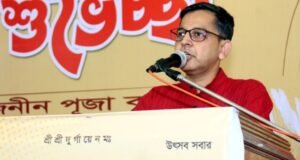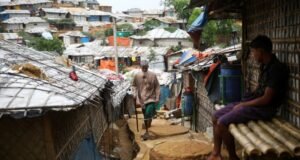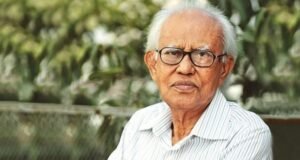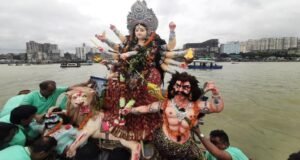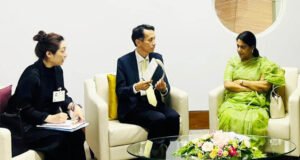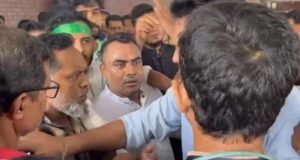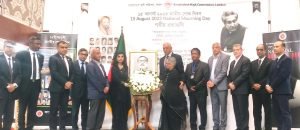
International Relations Affairs Adviser to the Prime Minister Sheikh
Hasina Professor Dr. Gowher Rizvi while speaking as the chief guest at
Bangladesh High Commission, London’s commemorative event on the
48 th martyrdom anniversary of Father of the Nation Bangabandhu
Sheikh Mujibur Rahman and the National Mourning Day 2023, said,
“Bangabandhu's assassination on August 15, 1975, was aimed to thwart
his vision of establishing a democratic, progressive, secular, and Bengali
nationalism-based Bangladesh and regress the country to its pre-
independence state.”
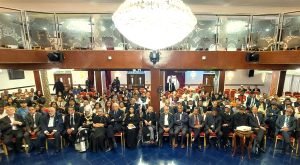
Dr. Rizvi, an internationally renowned historian and researcher, said,
“Prime Minister Sheikh Hasina has been working relentlessly to reinstate
Bangabandhu's values for establishing a progressive, secular, and
democratic Bangladesh.” The adviser urged all to strengthen further the
Prime Minister’s hand in her effort to achieve Bangabandhu's dream of
Sonar Bangla”.
High Commissioner for Bangladesh to the UK Saida Muna Tasneem
delivered the welcome speech at the high-profile event, organised on
Tuesday in East London. Internationally renowned lawyer Sultana Kamal
was the special guest at the event. Eminent organiser of Bangladesh’s
War of Liberation in the UK Freedom Fighter Sultan Mahmud Sharif,
Valiant Freedom Fighter Lokman Hossain, Member of London Assembly
Unmes Desai, former BBC journalist and editor of London-based news
magazine ‘Asian Affairs’ Duncan Bartlett and British-Bangladeshi
community personality Noim Uddin Riaz spoke on the occasion.
Paying profound respect to Bangabandhu and all the martyrs of the 15
August 1975 carnage, High Commissioner Saida Muna Tasneem said,
”The premeditated brutal assassination of Bangabandhu to eliminate his
entire family and the secular and progressive values by a few
treacherous anti-liberation, anti-democracy and anti-secular forces is
also recorded as an incident of unprecedented barbarism in human
history and a gross violation of international humanitarian law as it
stands apart from political assassinations of other contemporary leaders
such as Abraham Lincoln, Mahatma Gandhi, Martin Luther King and
John F Kennedy.”
The High Commissioner said, “Fortunately, the two daughters of
Bangabandhu, Prime Minister Sheikh Hasina and her younger sister
Sheikh Rehana survived the assassination as they were abroad at that
time, and are carrying forward Bangabandhu’s legacy until this day”.
The High Commissioner noted that Bangabandhu’s maiden UK visit as
the President of the newly independent Bangladesh on 8 January 1972
laid the foundation of progressive, inclusive, democratic, and secular
Bangladesh-UK relations in 1972. She urged all British-Bangladeshi
youths to embrace the values of the 1971 War of Liberation and draw
inspiration from Bangabandhu’s unwavering commitment to Bengali
nationalism, democracy, freedom, inclusiveness, and secularism.
Describing the unmatched brutality of 15 August 1975 when the 10-year-
old innocent youngest son of Bangabandhu with no connection to
politics was mercilessly murdered, eminent lawyer Sultana Kamal said
that the carnage was the ultimate crime against humanity. The lawyer
cautioned all about the conspirators who still want to destroy the spirit of
the 1971 War of Liberation and derail Bangladesh from the ideals of
Bangabandhu.
British journalist Duncan Bartlett shares a similar sentiment, stating that
the brutal assassination of Bangabandhu and most of his family
members aimed at erasing his name from Bangladesh's history.
However, the conspiracy failed in two significant ways. Firstly,
Bangabandhu's values continue to inspire and guide individuals who
seek to uphold his legacy. Secondly, Bangladesh's remarkable
economic progress is a testament to the enduring spirit of Bangabandhu,
which serves as a driving force for the country. The Economist, a
publication I am currently affiliated with, has recognized Bangladesh as
an impressive economic performer.
During his speech, Freedom Fighter Sultan Mahmud Sharif urged
British-Bangladeshi to stay alert against any attempts to hinder
Bangladesh's ongoing progress under the leadership of Prime Minister
Sheikh Hasina, who embodies the legacy of Bangabandhu and the spirit
of the 1971 War of Liberation.
At the event, the High Commissioner along with the guests and senior
officials of the London High Commission placed a floral wreath on
Bangabandhu’s portrait and unwrapped the cover of a Bangladesh High
Commission’s commemorative publication on the 48 th Martyrdom
Anniversary of Father of Nation Bangabandhu Sheikh Mujibur Rahman
and National Mourning Day 2023. A documentary on Bangabandhu by
Bangladesh’s Ministry of Foreign Affairs was also screened. Dedicating
to Bangabandhu and the martyrs of 15 August 1975, renowned vocalist
Munira Begum and Counsellor (political) at the Bangladesh High
Commission, London Dewan Mahmudul Haque recited poetry written by
celebrity poet Nirmalendu Goon.
The Day’s programme began with the lowering of the national flag at
half-mast at the High Commission followed by reading out of the
messages from the President, Prime Minister, Foreign Minister and State
Minister for Foreign Affairs. A Special munajat was also offered for the
salvation of the departed souls of Bangabandhu and his family members
and others who were brutally assassinated on 15 August 1975.
 Weekly Bangla Mirror | Bangla Mirror, Bangladeshi news in UK, bangla mirror news
Weekly Bangla Mirror | Bangla Mirror, Bangladeshi news in UK, bangla mirror news


